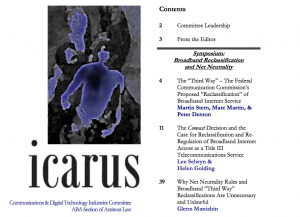A sample text widget
Etiam pulvinar consectetur dolor sed malesuada. Ut convallis
euismod dolor nec pretium. Nunc ut tristique massa.
Nam sodales mi vitae dolor ullamcorper et vulputate enim accumsan.
Morbi orci magna, tincidunt vitae molestie nec, molestie at mi. Nulla nulla lorem,
suscipit in posuere in, interdum non magna.
|

This is the opening paragraph of an article by this author appearing today in the Fall 2010 issue of Icarus, the newsletter of the ABA’s Communications & Digital Technology Industries Committee, Section of Antitrust Law. “If the issue of broadband reclassification is not addressed with sensitivity to the history and traditions of FCC common carrier regulation, one can all too easily arrive at conclusions that simply cannot be squared with the legal framework applied to telecommunications for more than 30 years.”
The highly polarized debate over so-called net neutrality at the Federal Communications Commission (FCC) exposes serious philosophical differences about the appropriate role of government in managing technological change. Neither side is unfortunately free either from hyperbole or fear-mongering. And neither side is completely right.
Read the whole essay. It’s provocative.
Note: I have not appeared as counsel for any party to the FCC’s current net neutrality NOI proceeding and was not paid to write this essay (despite what my colleagues and clients in the public interest community may claim). I represented Google in the past but now am ethically precluded from doing so because my law firm has a conflict of interest, being adverse to Google in an employment age discrimination case before the California Supreme Court. The article nonetheless does not reflect the views or opinions of my firm or any of my clients, past or present.
Speech is indeed effectively free in the age of YouTube. So that does undermine the scarcity argument traditionally used for the (now-defunct) “fairness doctrine” and the like. But some conservative pundits, like Gordon Crovitz in the Wall Street Journal today, argue this makes political campaign contribution limits both obsolete and unconstitutional. Why Campaign Political Speech Restrictions on Unions and Corporations Make No Sense [WSJ.com].
The problem is that while speech is free, campaign $$ is not. Crovitz equates money with political speech, something the Supreme Court did (erroneously in my view) way back in the 1970s in upholding some, but not all, Watergate-era campaign spending and contribution limits. That does not mean, as he implies, that restricting corporate political contributions is “silly,” because Cravitz’s own analysis shows that it is communication where technology has leveled the playing field, not political campaigns, with all their expensive pre-Web 2.0 trappings like air travel, rally planing and event staging.
In his defense, what Crovitz appears to be saying is that bans on pure corporate political speech, rather than monetary contributions, are problematic:
Whatever the arguments for blocking direct contributions by corporations and unions, McCain-Feingold goes beyond this and directly limits First Amendment speech. The Constitution doesn’t promise “equal” speech, just the freedom to speak.
I agree with that. But the premise that “direct contributions” are different should be the start, not a footnote, to this debate.
Wow, I’ve blogged in the past about how Real Networks’ devotion to subscription music distribution was an archaic business model. Now, Rob Glaser and company are about to launch a new software product that, if ruled lawful under the DMCA, may revolutionize movie distribution. Real Networks Throws Down the DVD Copy Gauntlet [FT.com]. In a post-Napster legal environment, however, it is fair to say that no one can predict with certainty how these sorts of issues will play out. But if Cablevision can offer a remote-storage DVR on the theory that users are copying, not the device’s software, there is a good chance Real is right. Good luck and Apple TV watch out now!
The French have views that strike Americans as strange on lots of issues, like Middle East terrorists, mistresses, Web censorship and now trademark rip-offs. So it was a big relief when, after last month’s French decisions for Louis Vitton and Hermes against eBay, the U.S. courts disagreed. It’s Up to You, Tiffany, to Keep the Counterfeiters Away [Law Blog-WSJ.com]. (The French apparently never got the memo that the Internet is a borderless network where national law can’t be effectively applied.) Seems that Tiffany’s high-priced lawyers argued that there was so much counterfeit merchandise sold on eBay that the company somehow had a legal obligation to police its auctions.
Well, that’s backwards. Intellectual property owners already can demand “notice and takedown” of infringing materials; the same thing is undoubtedly true of eBay. All that Vuitton, Hermes or Tiffany’s had to do was monitor auction and sales listings and notify eBay when they found fake items. Well, it’s much easier just to shift blame — and money — to someone else than take responsibility. All this case was about was moving financial responsibility for the cost of running a business (jewelry) from the retailer to the “deep pockets” dot.com company. That’s shameful.
In fact, U.S. District Judge Richard J. Sullivan in New York ruled that eBay and affiliates can’t be held liable for trademark infringement “based solely on their generalized knowledge that trademark infringement might be occurring on their Web sites.” The judge reasoned that when Tiffany notified eBay of suspected counterfeit goods, eBay “immediately removed those listings.” That’s the correct decision and strikes the appropriate balance between IP holders and Web sites, IMHO.
|
|

